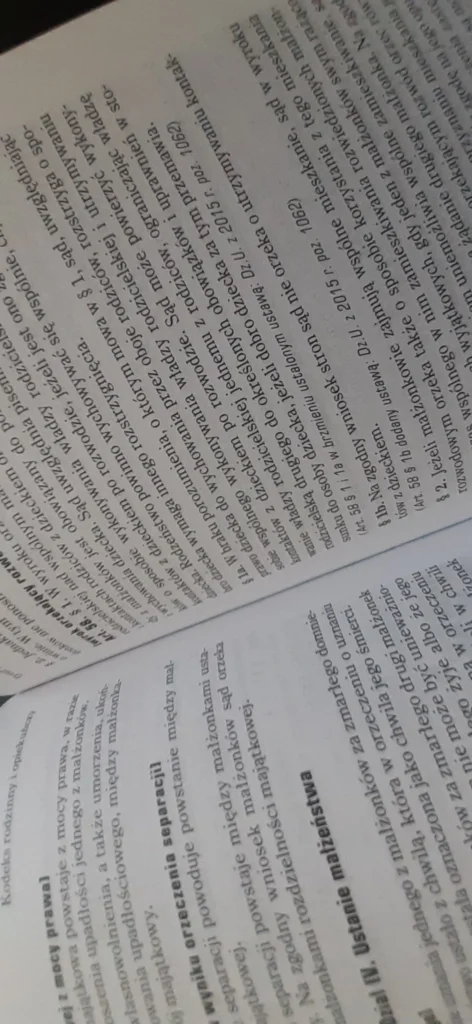If you have ties to Poland – for example if you and your spouse lived in Poland and one of you still resides here – there’s a good chance that Polish divorce law will apply to your case. Here is how it works…
All the roads lead through court
Some jurisdictions allow administrative divorce when both parties agree and there’s no conflict. Poland is not one of them. In Poland, there is no alternative to court proceedings – even if you’ve already signed a divorce settlement or agreement. The court must still review the case to ensure that granting the divorce would not violate the principles of social coexistence or harm the welfare of any minor children (I have personally never heard of a case where a court forced spouses to stay together for the sake of the children, but the legal possibility technically exists).
To initiate a divorce, one spouse must file a petition, effectively suing the other.
If the divorce is contested, the court will conduct a full evidentiary hearing. If both parties agree, the proceedings are typically limited to a mandatory hearing of both spouses and a review of the agreement between them.
What Are the Legal Grounds?
A divorce in Poland may be granted if the parties demonstrate that there has been a complete and permanent irretrievable breakdown of matrimonial life. This means that all essential marital bonds have ceased to exist: physical (the spouses are no longer engaged in sexual relations), emotional (the spouses no longer feel affection or love in a romantic sense) and economic (the spouses are financially independent, aside from any legally required obligations (e.g., child support); note that division of marital property can only occur after the divorce is finalized).

The court is also required to determine whether either spouse is at fault for the breakdown of the marriage. However, upon a joint request, it may refrain from making such a determination. This is an important aspect of the judgment, as fault may influence issues such as spousal maintenance (alimony).
What Does the Divorce Judgment Cover?
In addition to the divorce itself, the court’s judgment will address several issues related to family life and the future functioning of the household:
- Minor Children – the court will decide:
- which parent retains parental authority,
- how much child support (alimony) is to be paid,
- and the scope of contact between the children and the non-custodial parent.
- Shared Housing – if the spouses still live together despite the breakdown of their relationship, the court will decide how the shared residence should be used. In cases of domestic violence, the court may order the abusive spouse to leave the home.
- Division of Property – The court can divide marital assets during divorce proceedings, but this rarely happens. Such division nearly always delays the process, so courts typically leave it for separate proceedings unless doing so would not cause a delay (which is rare);
- Alimony for the spouse – the divorced spouse who has not been deemed solely at fault for the breakdown of matrimonial life and who is in need may demand that the other divorced spouse provide maintenance funds; moreover, if one of the spouses has been found solely at fault for the breakdown of matrimonial life and the divorce causes a significant deterioration in the material situation of the innocent spouse, the court, upon the request of the innocent spouse, may rule that the spouse found solely at fault is obliged to contribute accordingly to meet the innocent spouse’s justified needs.
Can a Spouse Say No?
A common trope in Polish TV dramas: one spouse refuses to grant a divorce, usually to torment the protagonist. In real life, it doesn’t quite work that way.
If the court finds that the complete and permanent irretrievable breakdown of matrimonial life has occurred, the divorce will be granted even over the strong objection of the other spouse.
There are, however, notable exceptions. A divorce will not be granted if:
- It would be detrimental to the welfare of the spouses’ minor children;
- It would be contrary to the principles of social coexistence;
- It is requested by the spouse solely at fault for the breakdown, unless the other spouse consents, or their refusal is – under the circumstances – contrary to the principles of social coexistence (for example the at-fault spouse has built a new life or family and the divorce is needed to formalize that new situation ).
Ultimately, divorce in Poland is designed to protect both parties and any children involved. Understanding the process can make a difficult experience at least a little more predictable.
The rules listed above are general and cover the most important aspects of the divorce proceedings in Poland. However, each case is unique and may involve different legal provisions. That’s why it’s essential to analyze the situation thoroughly before taking any steps. If you have any questions or need assistance from a lawyer, please do not hesitate to contact me via email (kotowska.kancelaria@gmail.com) or by phone (+48 608 393 623).
0 komentarzy